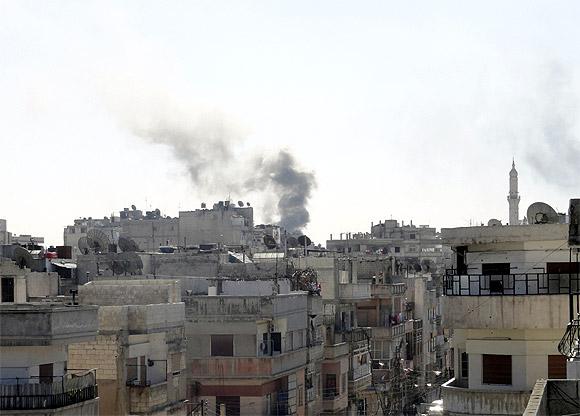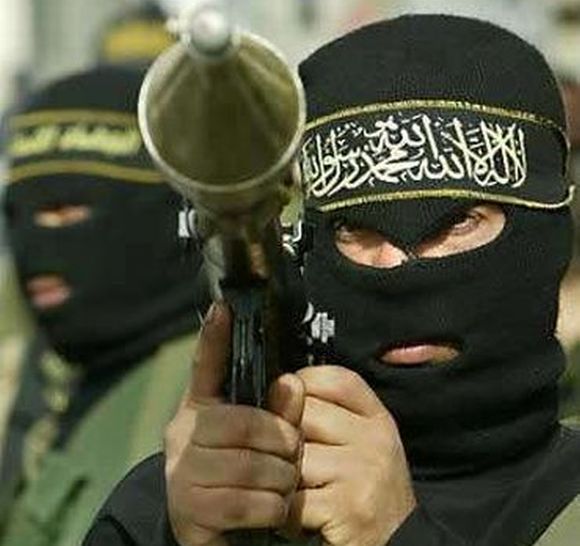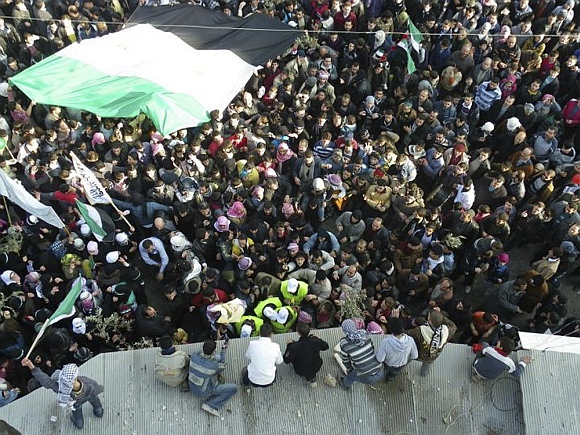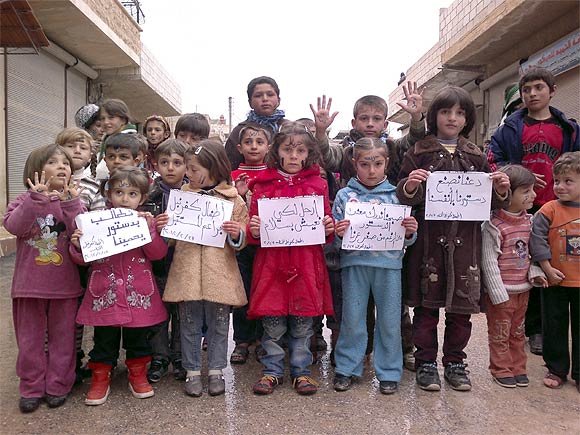 | « Back to article | Print this article |
Al Qaeda presence in Syria has government worried
Although the Al Qaeda is not present in large numbers, they are lethal and very determined, says Syria's Vice Foreign Minister Faisal Mekdad. Seema Mustafa reports
The Al Qaeda, in the form of hardcore Islamist groups, has started filtering into Syria with suicide bomb attacks becoming a frequent feature of the ongoing crisis.
The Syrian government has specific information of the "trickling in" of Al Qaeda operatives into the country to join and help those opposing the Assad regime with violence. In recent weeks, deaths and arrests of Arab nationals from Jordan, Tunisia, Iraq and other neighboring countries have been documented. Jordan, in recognition of this development, has tightened its borders with Syria to prevent the free movement of the Al Qaeda terrorists.
Last month two foreign terrorists were killed, and one captured, in a shootout in a dense Damascus colony Mezzeh. The three terrorists had occupied an empty apartment in the area and neighbours noted their presence. The landlord, living outside Syria, returned for a brief period but found that the locks had been changed and he could not enter the apartment. He reported the matter to the local authorities. Eventually there was a violent confrontation, with a security person and two terrorists killed. Later, a cache of arms and ammunition was recovered from the apartment.
Click NEXT to read further...
For Realtime News on Syria, click here
Recent attacks have Al Qaeda footprint
Similarly, the conflict between the Syrian government and the armed militia that was confined to certain "trouble spots" like Homs, Dera, has spread in the form of bomb attacks to other parts of the country as well. The tight security imposed by the Syrian government has managed to contain the violence but recent attacks have the Al Qaeda footprint, according to Syrian sources.
Car bombs in Damascus, Aleppo have killed and injured hundreds. Plastic explosives have been used in these for high intensity and maximum damage. This has struck new fear in the residents who had never faced this kind of violence and as a Syrian Engineer in Damascus said, "we have started living in fear now, as they can strike anywhere."
The Assad government has tightened security but is clearly worried about the heightened tensions as a result of the Al Qaeda presence. This comes at a time when the Syrian government had started recording considerable success in disabling the armed militia operating in the border areas of the country.
Syria's vice Foreign Minister and former Permanent Representative to the United Nations Faisal Mekdad admitted that the Al Qaeda elements had come into the country from Lebanon, Iraq, Jordan, Turkey and "although not yet present in large numbers, they are lethal and very determined". He said they were using lethal weapons and explosives in their attacks.
Click NEXT to read further...
'Saudi Arabia, Qatar, Turkey supporting armed groups'
The armed militia in the border towns, according to the Syrian government, comprises also of the Muslim Brotherhood and other extremist Muslims groups as well as criminals, smugglers, drug addicts and former prisoners wanted by the law. Mekdad said that the actual presence of the opposition Istanbul Council is negligible in Syria with "their leaders never having been here on the ground".
Crime levels in the rest of Syria have increased as a result with more kidnappings for ransom, robberies, and murder being recorded. Syrians have started pointing out that Damascus, one of the safest cities in the world, is not so any more. Local Governor Houseen Makhloof admitted that the levels of crime had increased dramatically.
The Syrians speak openly of external interference, with Information Minister Adnan Mahmoud pointing out that while the larger support to the conflict was being provided by the United States, Israel and Western European countries, the specific support to the armed groups was being provided by Saudi Arabia, Qatar and Turkey. Diplomatic sources spoke of evidence about centres being run by Turkey to train the militia, with a regular supply of sophisticated arms to the rebel groups.
Click NEXT to read further...
'There can be no religious differences amongst Syrians'
Faisal Mekdad regretted the efforts of some countries to push Syria towards "sectarian" strife, with the government making all efforts to retain the secular unity of the country. He said that Syria was being targeted only for its steadfast opposition to Israel and its support for the Palestinian cause. Everyone knows, he said, "that the moment Syria collapses the Palestinian cause will be finished." He said that Syria was very clear that it had allowed Hamas leaders sanctuary as "a resistance, and not as a religious force." He was responding to a question on statements by Hamas individuals against the government. Significantly, in the Arab world outside Syria as well, Hamas is widely perceived as a "US-Israel creation" and not as a political entity in its own right.
The Assad government is countering the propaganda of sectarian extremism led by ultra Sunni groups with undiluted secularism. Questions about religious identity are shunned by government leaders as rude and irrelevant, with great effort being put in underlining the unity of all sects and religious communities in the country.
The Grand Mufti of Syria, an established Sunni cleric of the entire region, Sheikh Hassoun, is clear that there can be no religious differences amongst Syrians. Referring to the Sunni ultras he said, "They say we are Muslims not extremists. I ask them when you form a government and you have a choice between a qualified Christian or an unqualified Muslim for president, who will you choose?" The choice, he added, should be for a just leader who ensures us our religious freedoms and justice.
This sentiment, interestingly, finds resonance across Syria with people on the streets asserting their unity, and openly criticising those who want to turn the country into a sectarian state. There are over 60 per cent Sunnis in Syria and the majority remains critical of those "trying to make us another Libya".
TOP photo features of the week
Click on MORE to see another set of PHOTO features...




